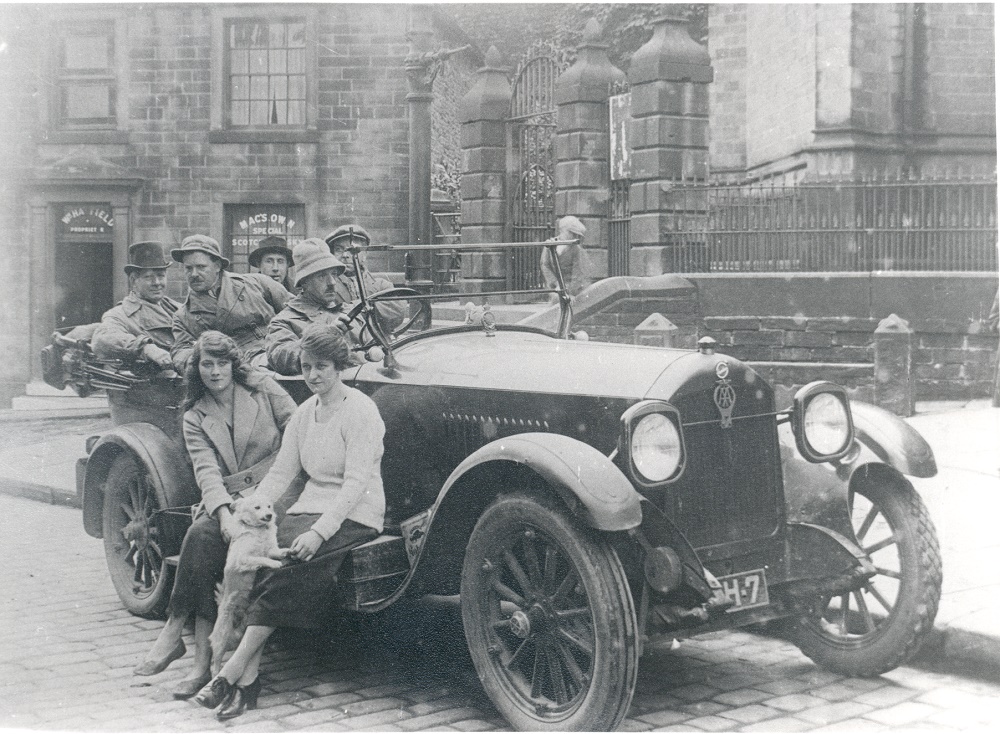Explore the latest news and find out what's on this month
Explore our learning offer for schools, families and community groups
Uncover the rich history of Elmbridge with our latest online exhibitions
Want to discover more about your local area?
Explore the latest news and find out what's on this month
Explore our learning offer for schools, families and community groups
Uncover the rich history of Elmbridge with our latest online exhibitions
Want to discover more about your local area?
Hepworth’s first major success in film came with the recording of Queen Victoria’s funeral in 1901. In the early stages of the company, he focused on directing before stepping back and producing under the company name Hepworth Manufacturing (later Hepworth Picture Plays).
Hepworth’s film career was a family affair, with he, his wife Margaret and eldest daughter Barbara making regular appearances. Cecil Hepworth’s ‘Alice and Wonderland’ is the first film adaption of Lewis Carroll’s famous children’s novel, complete with giant white rabbits and fantastic early special effects. ‘Alice in Wonderland’ starred Margaret as the villainous Queen of Hearts and the white rabbit, and she would go on to star in multiple films and was a huge influence on many of the film scripts.
Margaret Hepworth was instrumental to ‘Rescued by Rover’ (1905), writing the script and providing notes on direction. ‘Rescued by Rover’ and its part sequel ‘The Dog Outwits the Kidnapper’ (1908), both star Barbara Hepworth as the infant in need of saving by the family pet. Barbara would go on to feature in the 1912 Hepworth film ‘Pamela’s Party’. Previous to this, mother and daughter feature in the 1905 short ‘Baby’s Toilet’, an informative film on how to properly bath a baby.
While Hepworth studios grew to acclaim by utilising family members, the studios eventually fell as a result of expansion.
Image still from 'The Dog Outwits the Kidnapper' (Hepworth Studios, 1908) starring Cecil's daughter Barbara Hepworth.
Black and white photograph of Mrs Hepworth née McGuffie (left) with her sister driving a motorcar.
Black and white photograph of Cecil Hepworth and his family.
Hepworth’s films were some of the first to feature recurring actors and actresses, including Alma Taylor and Chrissie White, some of the earliest silent movie stars. Hepworth had an eye for business and saw the desire for recurring characters in film. His company produced the Lewin Fitzhamon ‘Tilly the Tomboy’ series between 1910 and 1915. Starring White and Taylor, the Tilly the Tomboy films are an early example of rebellious teenagers; they fight, prank and run away as much as any modern child. Sadly, few of these are surviving, but ‘Tilly the Tomboy Visits the Poor’ can be found in the British Film Institute (BFI) collections.
Hepworth created the first canine superstar in the 1905 film ‘Rescued by Rover’, where collie Blair plays the heroic lead ‘Rover’ who rescues a kidnapped child. Three years later, the sequel ‘The Dog Outwits the Kidnapper’ (1908) brought Blair back to save the day again. This time Rover chases down another kidnapper and upon catching up to them, steals the motor car with the missing child inside, driving them home to safety. Over 100 years later this canine adventure still delights with the final shots of Rover behind a steering wheel after (as the title promises) he successfully outwits the kidnapper.
Rover teams up with a horse in Lewin Fitzhamon’s ‘Dumb Sagacity’ in 1907, to rescue a young girl stranded in a high tide. The horse had previously played the lead in the 1906 film ‘Black Beauty’, becoming an equine celebrity of the early 20th century. Hepworth’s films really show the enduring love for animals in cinema, these heroic pets set the precedent for future Hollywood films.
 Image of scene from Helen of Four Gates, 1921, set in Hebden Bridge, Yorkshire.
Image of scene from Helen of Four Gates, 1921, set in Hebden Bridge, Yorkshire.
The beginnings of cinema fit neatly with the rise in popularity of the motor car, both involving shiny new machines that would reinvent daily life. These are combined in several of Cecil Hepworth’s films, notably the 1900 features ‘How it Feels to be Run Over’ and ‘Explosion of a Motor Car’.
Both films are incredibly short at only one minute long but they fit much into the run time. The aptly named ‘How it Feels to be Run Over’ shows the perspective of somebody in the path of a full speed motor car and for such an old film there’s still a sense of anticipation as the oncoming traffic approaches the camera. In a brief hoodwink, a horse and cart approaches but is quick enough to avoid the viewer, the motor car has no diversion and hits the camera full force. The final text “Oh! Mother will be pleased” is one of the first known intertitles on film.
The comedic and surprisingly gruesome ‘Explosion of a Motor Car’ provides a different perspective. The viewer watches as a motor car approaches carrying a fashionable and wealthy family, the car promptly explodes in a puff of smoke and to the bewilderment of a passing policeman. The situation only becomes more bizarre as body parts begin raining from the sky and the policeman, ever on duty, begins organising the limbs into piles.
These very short and darkly funny films both feature editing and tricks that would go on to be the foundation of many cinema staples. The suspense and comedy that can be found in these disastrous interactions with motor cars can still be felt today, with Hepworth’s early directional choices proving timelessly effective.
You can read more about Cecil Hepworth and his studio in Walton-on-Thames in our online exhibition ‘Cecil Hepworth: Cinema’s Forgotten Pioneer’.
Cecil Hepworth: Cinema’s Forgotten Pioneer